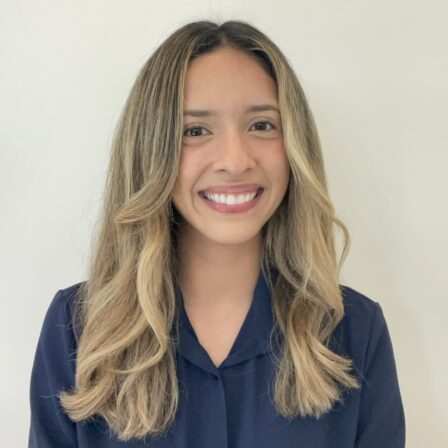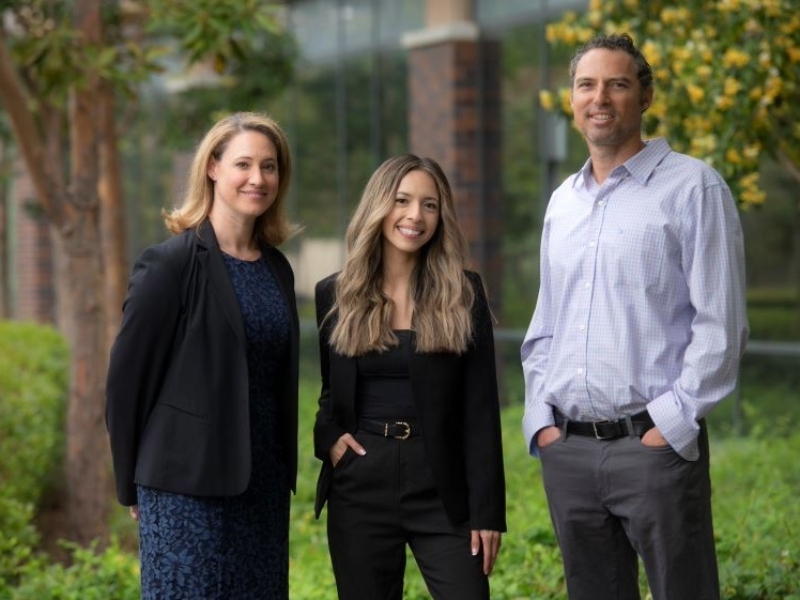Health Informatics Ph.D. Student Lidia Flores: A Rising Latina in Tech
Graduate Student Spotlight: Ph.D. student Lidia Flores talks about discovering informatics and starting a Latinx affinity group at UC Irvine.

Lidia Flores discovered her passion for health informatics while working as research associate in the Emergency Medicine Department for UC Irvine’s School of Medicine. After completing her undergraduate degree at UCI, she went on to earn her master’s degree in informatics and is now a Ph.D. student in UCI’s Donald Bren School of Information and Computer Sciences (ICS). “I was very passionate and interested in health informatics,” says Flores, “which led me to brainstorm ways in which to have a long-term career conducting research.”
Flores is now working on her dissertation, advised by ICS and Medical School Professor Sean Young, and her research findings have already appeared in publications such as the Journal of American Medical Association (JAMA) Surgery and Journal of Medical Ethics. She has also embraced her heritage as a chapter leader for Latinas in Tech and as the founder of the Latinx Affinity Group in the Department of Informatics. Here, she talks about her academic journey, discovering informatics and building a community of support along the way.
What first sparked your interest in health informatics?
As an undergrad, I took many different courses, including ones on Python programming and ubiquitous computing. That’s when I discovered informatics!
My senior year, I took a health informatics course, and I knew that’s what I wanted to study. From there, I started looking for research opportunities in health informatics, and that’s when I met Dr. Young and took a position in the Emergency Medicine Department.
What motivated you to pursue your Ph.D. at UCI?
I spent a few years running experiments in health informatics within my role in the EM Department. I decided to get a master’s in informatics to further my understanding of the subject. After a year in the program, I realized, “I can definitely see myself doing this as a career!”
I was very passionate and interested in health informatics, which led me to brainstorm ways in which to have a long-term career conducting research. So, I transitioned into the Ph.D. program, and it’s one of the best decisions I’ve made.
Can you talk about some of your research?
Throughout my Ph.D., I’ve worked on a wide range of research studies, from analyzing social media data to AI ethics. For example, I’ve conducted research into internet searches for self-managed abortions and AI bias in health surveillance. In investigating ethics-related research questions, I have examined methods of mitigating bias and potential harms and have explored how large language models trained with Internet data may contain misleading health information or bias.
A consistent overarching theme throughout my research has been to understand how health information is disseminated through technology.

What are your future plans?
For my dissertation, I’m interested in looking at medical misinformation and assessing the accuracy of health information disseminated from large language models. For example, can people identify inaccuracies when interacting with chatbots? If they can’t, what’s the impact, particularly when gathering health-related information? If someone is questioning the dosage for certain medications, can a chatbot acknowledge the need for verification from a physician? Can it flag inconsistencies in gathered data?
This work stems from research that I’ve done where I studied how misinformation from social media can influence people’s perceptions of certain health concerns. For example, in 2020, I looked at how public attitudes about COVID-19 were influenced by Trump’s social media posts before and during his infection.
Can you also talk a bit about joining Latinas in Tech?
Latinas in Tech is a professional networking organization that focuses on helping Latinas network in the tech industry. They host workshops on career-building skills, and I first learned about the group last year while attending the Grace Hopper Celebration, a women’s conference in computing. I wanted to get more plugged in and find a community of like-minded women in technology, so I joined the LA chapter. I’ve had the awesome opportunity to meet many other Latinas from across the country, and I’m now a chapter leader!

What about the Latinx Affinity Group?
In the first two years of my Ph.D. journey, I found it challenging to find other Latinas within the academic community. I began to share my experience with colleagues and was encouraged to start the Latinx Affinity Group in the Department of Informatics. We sent out a mass email, asking if anyone who identifies as Latino would like to join, and since then, I have found other Latinas within the department and formed a supportive community through weekly coffee shop study sessions! I’m grateful that there has been support from the department, and funding for our weekly meetings, and now I have a community that I really resonate with within the school.
This year, we hope to grow the group in ICS, reaching out to the Department of Computer Science and Department of Statistics to find other Latino or Hispanic graduate students who might want to join.
If you’re an ICS graduate student interested in learning more about the Latinx Affinity group, please contact floreslc@uci.edu. Also, all UCI students are encouraged to visit the Latinx Resource Center (LRC), which offers resources, programs, and a space where cultura, arte and academia are interconnected.
— Shani Murray